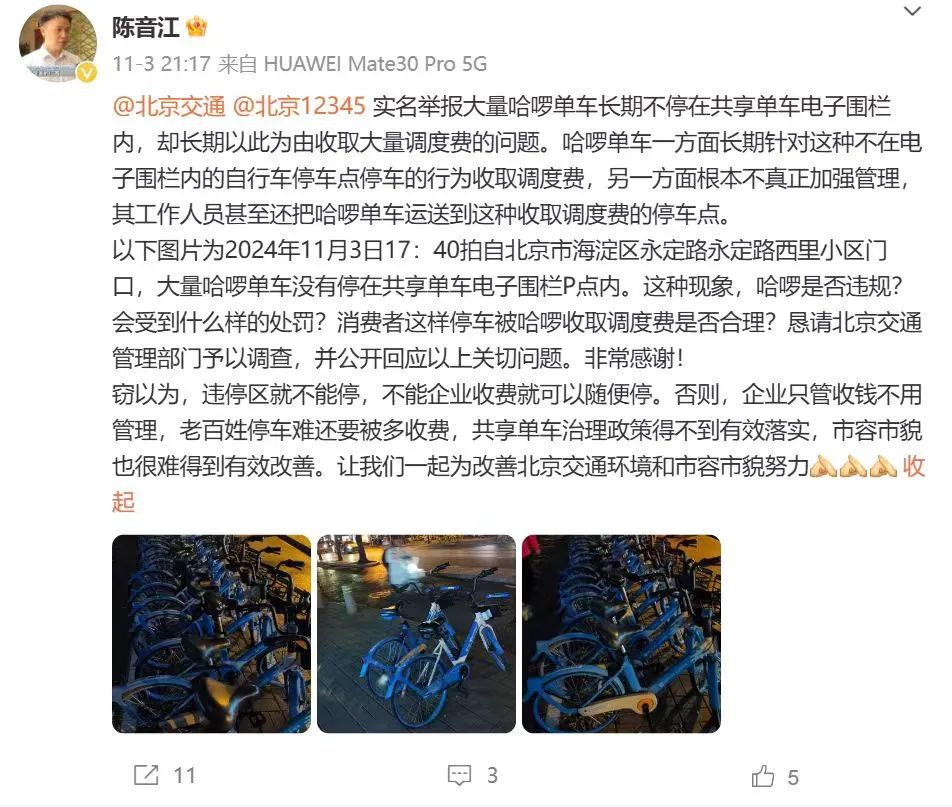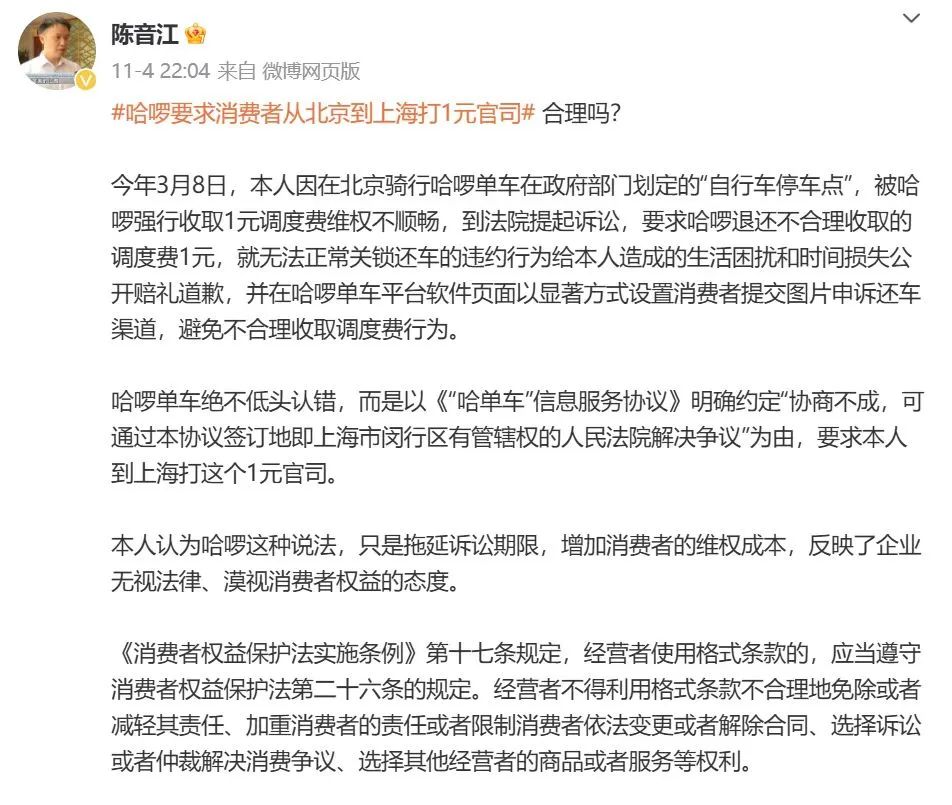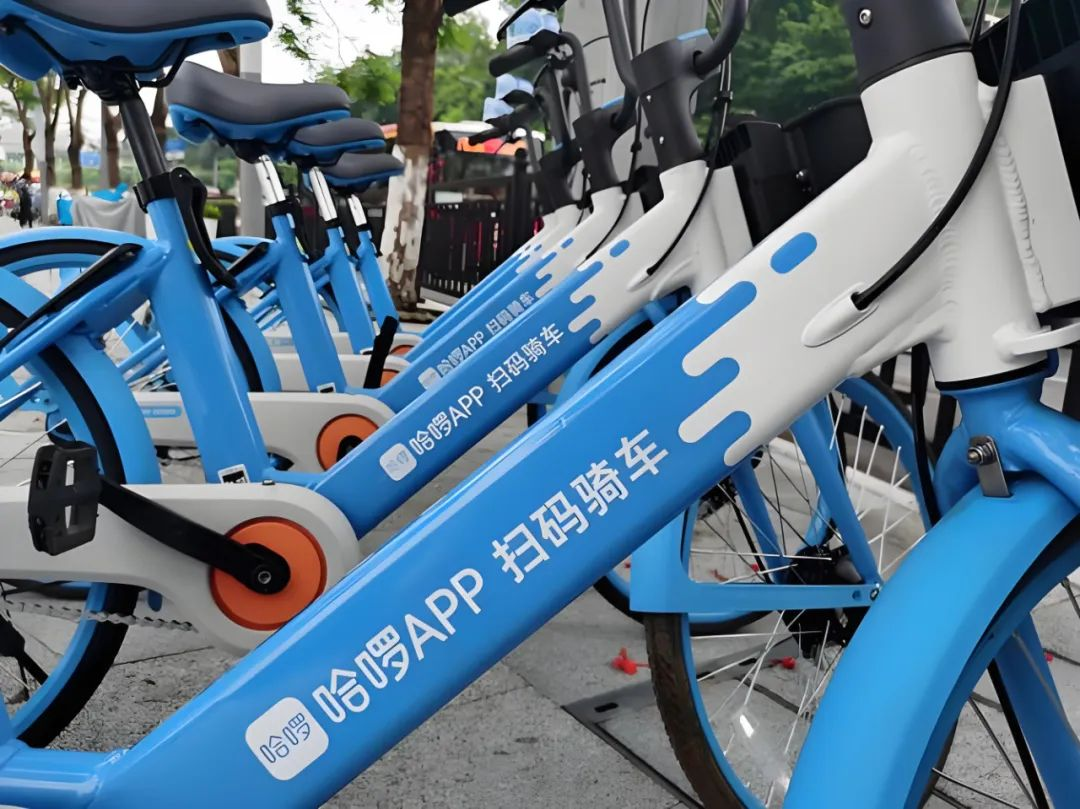Hello Bike faces criticism for difficult bike returns and unauthorized dispatch fees
![]() 11/08 2024
11/08 2024
![]() 634
634


Bike-sharing users often encounter difficulties in returning bikes. They ride to solve the "last mile" problem but are frequently hindered when locking their bikes, forcing them to pay dispatch fees.
@TechNews Original
Hello Bike faces criticism for inaccurate positioning, unauthorized dispatch fees, and unfair terms?
Recently, Chen Yinjiang, Deputy Secretary-General of the China Law Society Consumer Rights Protection Law Research Institute, once again posted an article criticizing Hello Bike for not parking within the electronic fence and yet charging excessive dispatch fees.
Chen Yinjiang also attached relevant images as evidence of a large number of Hello Bikes not parked within the designated electronic fence points in a Beijing area. In response to the post, Beijing's 12345 hotline stated that they would verify and handle the reported issues.

The problem of difficult bike returns has long plagued many bike-sharing users. They choose to ride bikes to solve the "last mile" issue but often get stuck at the final step of locking the bike, forcing them to pay dispatch fees. On the HeiMa Complaints platform, a search for Hello Bike revealed 7,285 complaints, with 287 complaints in the last 30 days. Most complaints indicated unauthorized charging and excessive dispatch fees by Hello Bike.
01.
Unauthorized Dispatch Fees
Chen Yinjiang told Sina Tech that Hello Bike is suspected of unauthorized dispatch fees, questioning their "double standards"—"If I park outside the fence, it's a penalty, but if they do it, it's compliant?" He once rode a Hello Bike and parked it at a designated bike parking spot by the government, only to be charged a dispatch fee by Hello Bike for not parking within the electronic fence. However, to his frustration, he found that Hello Bike operators had parked many bikes there.
Chen Yinjiang sued Hello Bike over the 1 yuan dispatch fee and sought compensation of 1 yuan. Notably, Hello Bike provides services to consumers nationwide, but its user agreement requires that disputes be resolved only through litigation in the relevant courts in Minhang District, Shanghai. Chen Yinjiang believes that this clearly excludes and restricts consumer rights while lightening the company's responsibilities, making it an unfair term.

Regarding the difficulty in returning bikes, a technical staff member told Sina Tech that Bluetooth anchors are installed in the "electronic fence" area, but these anchors are easily damaged in open environments, and signal coverage in parking areas cannot be guaranteed, potentially affecting bike returns. A staff member from a bike-sharing company introduced that crowded areas can also block signals. Therefore, in areas with many high-rise buildings, especially those with many mirrored surfaces, the accuracy of location signals can be affected.
Regarding the issue of users only being able to file lawsuits in Shanghai, Li Bin, a lawyer from the China Consumers' Association's lawyer team and from Zhongwen Law Firm, told Sina Tech that electronic clauses requiring disputes to be resolved in the jurisdiction must be prominently and clearly indicated to the counterparty for the clause to be effective.
Hello Bike not only faces problems with difficult returns but also illegal advertising. Previously, consumers in Wuhan reported that many shared bikes displayed illegal advertisements. The responsible person from Hello Bike stated that in recent years, they have included the removal of small advertisements from bike bodies as part of the daily cleaning tasks for operators, with up to 13,000 advertisements removed daily. However, the issue of bikes being plastered with advertisements persists.
Failure to promptly remove illegal advertisements from bikes will inevitably provide a poor experience for users. This is a problem that bike-sharing companies, including Hello Bike, urgently need to address.
02.
Frequent Price Increases
Although the problem of easy bike borrowing but difficult returns remains unsolved, it does not prevent bike-sharing companies from raising prices.
In July this year, many netizens reported that some bike-sharing brands had increased prices in disguise. Taking a certain area in Guangzhou as an example, the starting price for Hello Bike on weekdays is 1.5 yuan for the first 10 minutes, while on holidays and weekends, it is 1.8 yuan for the first 10 minutes. For every additional 10 minutes, the fee is 1 yuan for every 15 minutes. Previously, the starting price for weekdays in this area was generally 1.5 yuan for 15 minutes. If converted to an hour, the cost for weekdays has increased from 4.5 yuan to 5.5 yuan.

In April this year, netizens heatedly discussed the silent price increases during holidays by some bike-sharing companies, with starting prices rising to 1.8 yuan for 15 minutes. According to an analysis by Jiang Han, Senior Researcher at RDI, cited by the Global Times, early capital-driven expansions of bike-sharing companies disregarded costs. However, as market enthusiasm waned and capital withdrew, companies faced profitability pressures, making price increases inevitable.
Hello Bike's prospectus released in 2021 showed that from 2018 to 2020, revenue from bike and e-bike sharing amounted to 2.114 billion yuan, 4.544 billion yuan, and 5.503 billion yuan, respectively, accounting for over 90% of total revenue. During these three years, the company's overall net losses were 2.208 billion yuan, 1.505 billion yuan, and 1.134 billion yuan, respectively.
In the same prospectus, Hello Bike also revealed rapid growth in its ride-hailing service. However, in September this year, Hello Bike's ride-hailing service was exposed for unauthorized deductions totaling over 3,000 yuan in 21 transactions within 7 days.
After failing to go public in 2021, Hello Bike has not disclosed revenue or other data since then. However, from previous prospectuses, it is clear that shared bike and e-bike services are the primary sources of revenue, and these remain its core business. Difficult returns may be a technical issue, but consumers should not be held responsible. Hello Bike should properly address this issue to avoid consumer doubts about profiting from "dispatch fees".
- The end -




